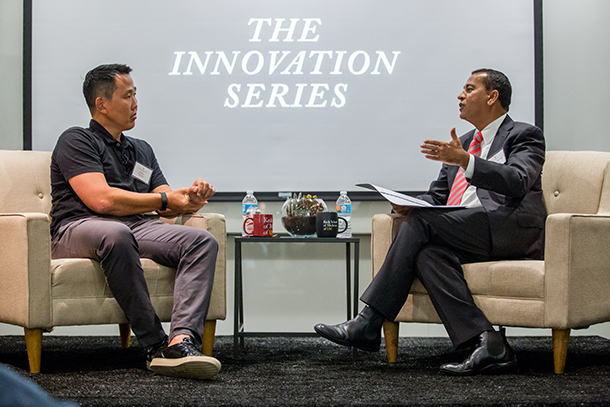Innovation in medicine, the role of groundbreaking technology and venture capital were the subjects of an engaging and well-attended conversation between Rohit Varma, MD, MPH, dean of the Keck School of Medicine of USC, and renowned angel investor David Lee, JD, MS, co-founder and managing partner of Refactor Capital, which describes itself as a $50 million venture capital firm designed to “invest in founders solving fundamental human problems.”
The discussion, held July 18 on the Health Sciences Campus, was the latest installment in the Innovation Series, sponsored by USC Digital Health (D-Health) Lab, a health care innovation lab established in collaboration with Keck Medicine of USC to address the challenges facing modern health care providers today.
“The purpose of the innovation series is to convene thought leaders at USC, Keck Medicine, and the greater L.A. community to discuss how we can drive the culture of innovation here, and better impact our communities,” D-Health director Karthik Murali, PhD, explained to the audience.
Lee and Varma, he said, “are both very mission-driven, and both believe in the value of using technology for public good.”
Lee, who was named one of the top technology investors by Forbes magazine, is considered by many to be a visionary in start-up investing circles. Prior to Refactor, he was the managing partner of SV Angel, where he invested in companies like Airbnb, Oscar Health, Dropbox and Pinterest.
Varma is one of the highest-funded ophthalmologists by the National Institutes of Health in the world and has earned funding for his research for more than two decades. Currently, in addition to serving as dean of the Keck School, Varma is pursuing new imaging technology that could improve early diagnosis of optic nerve damage in people with glaucoma.
Varma opened the conversation by asking Lee about his investment strategy.
Lee said that the founder of the company was one of the most important factors to consider. “What is it about them that’s unique?” he explained. “One test I use is, I’m 48 and I’m looking at someone who is 22 and I’ll ask myself, would I work for this person? Would I follow this person?”
Another factor was how the core idea of the company translates, Lee added. A successful start-up “has to be able to take something very complex and not only explain it but get you excited about it,” he said.
Varma spoke about his career-long interest in community and public health, noting that it isn’t an area that attracts a lot of technological investment. “What can one do to see more of this sort of entrepreneurial work in that public health space?” he asked Lee.
“The younger generation today, for whatever reason, really thinks about the greater good,” Lee responded. “I think for someone who is 24 or 25, with a background in public health, there’s someone out there who is unstoppable, who will just say, ‘I don’t have a choice but to do this. This is all I think about and failure is not an option.’ ”
Cultivating and nurturing that kind of mindset is an integral part of the Keck School education, Varma explained.
“We’re working to create a culture of innovation at Keck Medicine and the Keck School, in health and in other areas as well,” Varma said.
— Leigh Bailey


